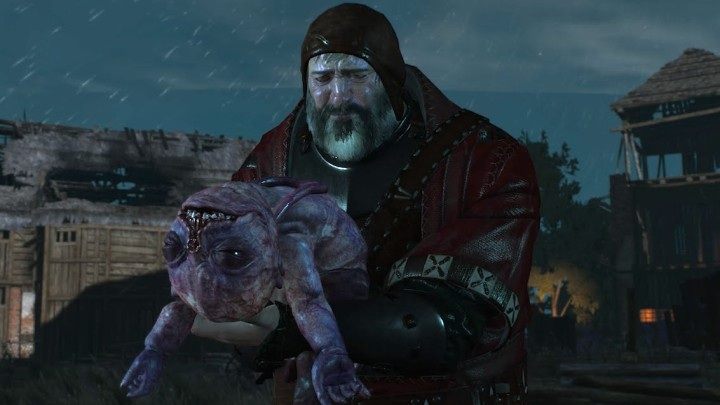Darker (more colorful?) shades of Andrzej Sapkowski. Who is Andrzej Sapkowski? The Best Quotes from the Ultimate Game Master

- Who is Andrzej Sapkowski? The Best Quotes from the Ultimate Game Master
- The Witcher – a thorn in the side of the author
- Computer versus meat grinder
- Modesty – a cured disease
- Pride (of the writer) and Prejudice (of anti-fans?)
- Defender of readers, guardian of fantasy lovers
- Darker (more colorful?) shades of Andrzej Sapkowski
Darker (more colorful?) shades of Andrzej Sapkowski
Nevertheless, every situation in which Andrzej Sapkowski reveals his more decent human nature is immediately followed by his darker sense of humor which may be offensive to sensitive listeners. Or he simply dumps on the representatives of a chosen group or society (this happens sometimes to the delight of people who aren't connected with a given group):
M.S.: Are children the embodiment of the bourgeois lifestyle? Is that the reason you don't like them?
A.S.: I prefer to remain silent with regard to the bourgeoisie and philistinism, because I'm not a rebel without a cause, no sort of Przybyszewski or James Dean. Besides, I can feel my age and the time will come to join the club. I will explain, however, that my attitude towards children and dogs has nothing to do with revolution and my disgust towards the terrible bourgeoisie. It just so happened that wherever there were children and dogs, some bloody unwritten bon ton forced us to admire them. But I wasn't admiring them because there was nothing to admire. And although I had some social problems, I held up bravely and I hold on until this day. Dogs and children... Well, let's put it mildly, they’re unaesthetic.
Interview in a woman’s magazine, 2001

What advice would you give to young people who are just trying to become a writer?
AS: I would sincerely advise them to get this foolish idea out of their heads and search for some decent and useful job.
Interview with 'G Crew', 2002
The matter is as simple as a drawbar – you lack imagination? Don't write. Try out some other professions. Become a politician, it doesn't require any imagination nor intelligence.
Interview with Empik News, 2004
Generally speaking, I have only one complaint against journalists, and that is not a contrived one, but is supported by an unpleasant yet substantial experience: in most cases, they are ignorant people who know nothing and don't have any knowledge on many things – but nevertheless they think that they know everything and can act as oracles.
Literature researchers and scholars like to compare things. Firstly, that's what they do, and secondly, they have to prove that they've read something more than the work they've just been studying and reviewing. I was just joking, sorry.
(...) access to weapons should be free, because access to everything should be free. To absolutely everything. You cannot ban pornography by claiming that it has a bad impact on someone. It doesn't have any bad impact on me, so I find this argument ridiculous, and I perceive such a prohibition as an attack on my freedom. If I would crave pornography, even the hardest one, I should have it at will, because that's what I want. Yeah, it is unlikely that I crave it, but it doesn't change the principle.
(...) Of course, there is a group of writers who, while being depressed, can only create sad scenes, and when they rejoice – only joyful moments, because their mental state limits them. I'm not limited by that. Tomorrow I will sit down and write the story of Saint Catherine of Siena in first person. What's so hard about it? I'll use the sources, read everything I can, and describe to you how she had sex in Florence with a young pawn shop owner. They're going to curse me right after that, but I'm going to write it anyway. And then I'll write about St. Francis, Savonarola, or Bernard of Clairvaux.
History and fantasy, 2005
Will you say that the last statement is distasteful or even iconoclastic? Well, when it comes to the church, or perhaps the whole topic related to religion – Sapkowski is very exact and unrestrained. In the same book he admits:
Even ‘agnostic’ doesn’t do me justice. My worldview is not agnosticism, atheism, or laicism. It's pure paganism. Really, I'm a pagan, and I mean that as in the textbook meaning of the word. I reject all mysticism, I have no idols and I do not believe that I will be punished for any sins, or ascend to heaven. What is worse, I am deeply convinced that when I die and somebody would dump my body in a dumpster around the corner, that would mean as much to me as if I was buried on a catafalque in main cathedral of Gniezno. I'll be wort as much as a dog's carcass when my biological functions stop.
An anecdote at the end
Before the conclusion, in order not to end the article on such a somber tone, I would like to recall an anecdote which Sapkowski tells his listeners at practically every meeting. This is a story about how AS, shortly after his literary debut, went to his first fantasy convention. It was before the end of the 80's:
I dressed like a fool – I worked in foreign trade, so I was convinced that if you go to a meeting with readers, you should look decent. I put on my suit. And a tie. And it started. They stared at me like I was an idiot. (...) It ended with someone spreading a rumor that I was from secret police, sent to observe young people and check if they weren’t saying anything unpleasant about Comrade Brezhnev. Because young people may fantasize about a different political system in Poland than socialism!
At that time, I was still a stupid neophyte and I attended all the meetings and discussions – with editors, publishers, translators... Then I got wiser – I didn't attend any of these meetings, I just sat with other authors in a bar and chatted about literature. We would sometimes spend 24 hours doing that.
Let's go back to Olsztyn: a meeting with the editorial team of Fantastyka is currently taking place, as well as a discussion about development, authors and publishing plans. I am sitting in the front row and Marek Oramus fixes his eyes on me and suddenly, interrupting someone in mid-sentence, he asks: ‘Sir, have you read any fantasy stuff?’ And I'm like: 'Today?'. And I mentioned some fresh title, brought recently from abroad. It was by Zelazny. Oramus gaped at me because he didn't read in any foreign language. 'Oh, then I'm sorry', he said. He was really convinced that they sent me from some communist committee, so he wanted to make a circus in front of everyone.
History and Fantasy, 2005
And I'm going to throw in an epilogue of that story so we can have a happy ending:
S.B.: Were you finally accepted by this society?
A.S.: Yes, thanks to my friendliness and funny character I got rid of the image of a grumpy grandfather, with whom you can't play. Others, however, had many problems with it – they came to meetings, but were subjected to ostracism. They weren't invited to the rooms and no one wanted to drink with them. However, I quickly gained a lot of friends there. Enemies too, anyway. They were interesting people, individualists.

Troll or fortune teller?
I'm spouting these reflections about Andrzej Sapkowski over many pages, but in fact I barely scratched the surface, and the ultimate answer to the question ‘Who is AS?’ still seems to be out of reach. But we're running out of space to keep scratching. The short conclusion is that we are dealing with a complex and multidimensional figure, which cannot be presented exhaustively in a modest online article... But you can say the same about almost every man, can't you?
Anyway, for those of you who would like to make a more complete opinion about AS, or hang on his every word, then please refer to the sources. The best way is to reach for the History and Fantasy book, which has been quoted many times in this article, and in which Stanislaw Beres has picked the writer's mind more than anyone else. However, this is currently a very rare book. If you don't manage to get your hands on it, there are some interviews left on the Internet – take a look around and you'll find the whole repository quite easily.

To sum the things up, I will only repeat the point I made at the very beginning of this article: I like Andrzej Sapkowski. I like him very much. And despite all the nonsense, despite the insults, despite all his views with which I disagree, I still have a weakness for him. The same weakness that you may have to your own grandfather, who has his own eccentricities – sometimes he says something awkward or confusing, but still remains a treasury of knowledge and an inexhaustible source of fantastic stories.
I will tell you more: I would like to interview Andrzej Sapkowski myself one day, maybe even invite him for an extended interview. Of course, it wouldn't end well for me, because Sapkowski doesn't like journalists and I don't like alcohol. But to get a chance to receive your very own personal insult from a legend once called “the greatest buffoon of Polish literature”... That would be some kind of life achievement, wouldn't you say?




